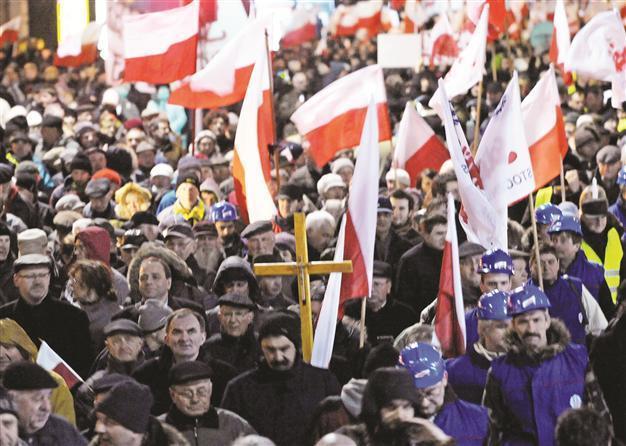Polish Church feels crisis pain
WARSAW - Agence France-Presse

Protestors hold up a cross during a demonstration against raising the retirement age to 67 in Warsaw, Poland, on March 14. A possible cut in Church revenues is also triggering public anger. AFP photo
The Polish government proposed on March 15 to reform state funding for churches and other religious communities by shifting some burdens from state coffers to believers in the devoutly Catholic state.
The move comes after the unprecedented rise of an anti-clerical party in the homeland of the late pope John Paul II in its October 2011 general election.
Polish religious communities are now largely financed by the state budget, using a special fund covering in particular social insurance for clergy, which cost 89 million zloty ($28 million) in 2011.
The Roman Catholic Church is the main beneficiary but other denominations and religions are also subsidized.
The government has proposed to scrap the fund as of 2013 and replace it with voluntary contributions from taxpayers of up to 0.3 percent of their tax bills, which they can send to a religious community of their choice instead of to the state.
“The plan is designed to give churches and religious communities autonomy in the payment of welfare taxes” for the clergy, read a statement issued before a meeting between the government and Poland’s Roman Catholic episcopate.
‘A starting point’The government of Poland, a country of 38 million people where Catholics make up 90 percent of the population, expects the new system will generate about 100 million zlotys in social insurance coverage for Christian, Jewish and Islamic clergy serving in the country.
Archbishop Slawoj Leszek Glodz, an influential member of the Polish episcopate, said the government plan was “a starting point” for a debate.
“We see the plan as a starting point. A bilateral working group... will meet next week and the talks will begin,” Glodz told reporters after the episcopate met Minister Michal Boni, responsible for the reform.
“In a matter of such importance, the two parties must join forces to seek a definitive solution,” he added.
Reverend Adam Pastucha of the Lutheran Church told the PAP news agency it was necessary to “examine the details of the plan to see the final sums, before making a statement”.
Polish authorities have given all religious communities 30 days to comment on the plan, which also requires parliamentary approval to take effect.
Poland’s October 2011 elections saw a new anti-clerical party, the Palikot Movement, storm into the nation’s parliament for the first time.
Launched by flamboyant former vodka tycoon Janusz Palikot, it took 40 seats in the 460-member parliament.
The Palikot Movement wants to ease Poland’s strict anti-abortion law, seeks an end to public funding of catechism classes in state schools and backs same-sex partnerships.
